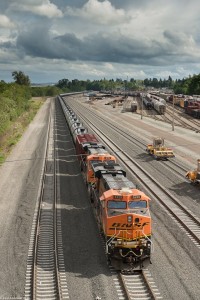UPDATE: January 10, 2014
Riverkeeper's Clean Water Attorney, Miles Johnson, and his co-counsel will argue in Clark County Superior Court this week that the Port of Vancouver failed to acknowledge the dangers of the proposed oil-by-rail project, and side-stepped Washington’s public meeting laws by making key decisions in closed, secret meetings. Riverkeeper and our partners are arguing that the Port violated Washington’s public meeting laws and acted prematurely, without the benefit of any environmental review. Click here for The Columbian's coverage of our lawsuit
Port of Vancouver’s secret meeting about controversial oil lease violated the law; groups file lawsuit.
The Port of Vancouver violated the Open Public Meetings Act when approving a lease agreement for a controversial oil-by-rail project, according to a lawsuit filed October 2, 2013, in Clark County Superior Court. Under the lease, Tesoro proposes to build a new marine terminal at the Port of Vancouver to receive up to 380,000 barrels of oil or other “petroleum products” every day by trains, and then ship the oil in supertankers down the Columbia River.
“An Exxon-Valdez type spill from a supertanker or oil train would devastate the Columbia River,” stated Brett VandenHeuvel, Executive Director of Columbia Riverkeeper. “The Port should have held a transparent public debate instead of negotiating with the oil companies in secret.”
Three public interest groups, Columbia Riverkeeper, Sierra Club, and Northwest Environmental Defense Center, brought the lawsuit. The complaint alleges that the Port violated the Washington Open Public Meetings Act by: 1) deliberating on the lease outside of public meetings, and 2) using a secret “Executive Session” for improper purposes. The lawsuit seeks to have the lease overturned and require the Port to discuss the lease decision in public.
“The Port wanted to keep the dirty oil plans secret,” stated Marla Nelson with the Northwest Environmental Defense Center. “In light of the oil train explosion in Quebec that killed over 50 people, it’s shocking that the Port of Vancouver didn’t have a more transparent process.”
After the three Port Commissioners approved the oil terminal lease on July 23, 2013, The Columbian ran a story titled, “Port of Vancouver runs afoul of meetings law.” The Columbian quoted Tim Ford, the Washington Attorney General’s open government ombudsman, stating:
Port commissioners should “do a redo,” Ford said. “Go back into a public meeting to discuss what was discussed in executive session. They should do that.” He added, “The public has the right to witness the deliberations of the port commission.”
The Port signed a lease that allows shipment of any “petroleum product.” Rail cars could carry the same Bakken crude that exploded in Quebec or tar sands from Canada, passing through the Columbia River Gorge and rolling within several blocks of downtown Vancouver and hundreds of residences. The scale of oil transport is unprecedented: 380,000 barrels per day by rail is 45% of the capacity of the controversial Keystone XL Pipeline.
Dozens of Vancouver citizens testified against the lease, raising concerns about public health, oil spills, oil trains clogging traffic, reduced property value along the rail route, and the climate change impacts of exporting more oil.
Lehman Holder of the Sierra Club’s Loo Wit Group stated: “The Sierra Club opposes the proposal to move oil by rail to the Port of Vancouver and the plan to build a huge oil storage facility at the Port. The Sierra Club’s Loo Wit Group would much prefer to see investment in cleaner, renewable energy, rather than a continued reliance on fossil fuels. We strongly believe that the Port of Vancouver should rethink its decision to go ahead with such an ill-advised project.”
Due to the enormous scale of the oil terminal proposal, state law requires Governor Inslee to make the final permitting decision, after the Washington Energy Facility Site Evaluation Council reviews the application. “We’re hopeful Governor Inslee will recognize that shipping massive volumes of oil or tar sands is inconsistent with Washington’s goal of a healthy climate,” stated Riverkeeper’s Brett VandenHeuvel.
The groups are represented in the lawsuit by Smith & Lowney, PLLC.
Learn more about the Port of Vancouver oil terminal here: http://columbiariverkeeper.org/our-work/oil-by-rail/
And oil-by-rail in the Pacific Northwest here: http://www.sightline.org/research/the-northwests-pipeline-on-rails/



